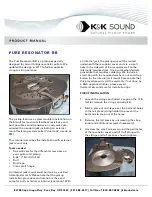
B-2
Operating Principles
B.1 Complete Blood Count (CBC)
The analyzer utilizes impedance technology whereby electrically neutral blood cells pass through an
electrically charged aperture thereby generating a “pulse.” Cell counts are determined by the number of
pulses measured in a given volume of blood over a set period of time. The decrease in electrical con-
ductance (degree of intensity) as measured is directly proportional to the cell volume. This size dis-
crimination, along with susceptibility to various lysing agents distinguish the basic cell types (red,
whites, platelets).
B.2 Measurement Methods
This section provides an overview of the hematology measurement methods used by the analyzer.
B.2.1 Volumetric Impedance Method
The analyzer uses a volumetric impedance method of counting blood cells. The following figure illus-
trates this method.
The principle of this method is that blood diluted with an isotonic solution (Diluent) conducts electric
current by ionic conduction. A counting chamber made of an insulating material (plastic) holds this
diluted blood, while a small circular hole (aperture) in this chamber allows the flow of diluted blood.
(The analyzer aperture diameter and length is 80 µm — the optimal size for veterinary hematology.)
Placing two electrodes on the two sides of this aperture and applying constant electric current causes
the isotonic solution to conduct electricity, and allows a voltage to be measured on the aperture.
Applying pressure to the diluted sample causes it to flow through the aperture. When a cell is passing
the aperture, a small change in electric impedance occurs, so that the voltage rises somewhat and a
small electric pulse occurs. The amplitude of this pulse is proportional to the ratio of the cell volume
(size) and the aperture volume: the bigger the cell, the higher the pulse.
Summary of Contents for VetScan HM5
Page 1: ...Operator s Manual ...
Page 2: ......
Page 4: ...1 2 ...
Page 6: ...1 4 ...
Page 26: ...2 10 Installing the VetScan HM5 ...
Page 38: ...3 12 Settings ...
Page 50: ...4 12 Running a Sample ...
Page 64: ...5 14 Quality Control and Calibration ...
Page 80: ...6 16 Maintenance Service ...
Page 88: ...8 4 Shutdown ...
Page 112: ...9 24 Troubleshooting ...
Page 126: ...A 10 Introduction to Veterinary Hematology ...
Page 136: ...B 10 Operating Principles ...
Page 154: ...D 16 Veterinary Case Studies ...
Page 163: ......
















































